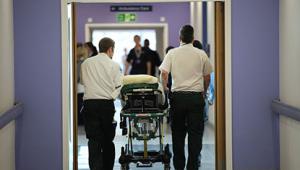Data from Monitor and the NHS Trust Development Authority shows the 151 NHS foundation trusts had a deficit of £445m from April to June, while other trusts had a deficit of £485m.
Both these deficits are higher than forecast – by £90m for foundation trusts and £73m for other providers – in part due to higher pay bills for agency workers, the watchdogs said.
However, both bodies stated that these costs were expected to fall as a result of new controls.
Monitor’s analysis of foundation trusts, which make up a majority of NHS providers, also found that they had missed a number of national waiting times targets, including accident and emergency admissions, routine operations and some cancer treatments. Trusts had also struggled to deal with an increase in demand for diagnostic tests, partly due to staff shortages and ineffectively organised services.
Chief executive David Bennett said trusts were working hard to provide patients with quality care.
“However, today’s figures reiterate that the sector is under massive pressure and must change to counter it.
“The NHS simply can no longer afford operationally and financially to operate in the way it has been and must act now to deliver the substantial efficiency gains required to ensure patients get the services they need.”
The watchdog had already taken action to help the sector improve operationally and financially and would continue to offer our support and guidance, he added.
“But the foundation trust sector must realise that a radical and lasting change is required.”
Responding to the figures, CIPFA chief executive Rob Whiteman said the deficits revealed today “may be the thin end of wedge”.
He added: “Whilst expecting trust boards to take action to reduce these deficits, the government, NHS Trust Development Authority and Monitor should be equally unambiguous to trusts, and particularly to their non-executive directors: they must report in full their expected out turns during 2015/16, even if this worsens the headline figures.
“We must avoid the problem that the system generates the numbers that are wanted top-down, rather than being reflected in internal management accounts bottom-up. This simply stores up trouble down the line.”
Paul Briddock, director of policy at the Healthcare Financial Management Association, said FTs were facing their most challenging financial environment in recent years.
“Worryingly the Quarter 1 2015/16 position is already £96m worse than the foundation trust deficit for the whole of 2014/15 and the overall forecast deficit for 2015/16 is just over £1bn, £80m worse than the original plan of £931m.
“The financial situation is currently looking dire and it is a critical concern for those in the sector.”
He highlighted that it was now 182 days since Prime Minister David Cameron's election pledge to inject an additional £8bn into the NHS, but there had not been any confirmation of when this investment will be made.
“They now need keep their promise and make their pledged investment a priority. As the new government's honeymoon period comes to a close, this extra funding is critically important in order to help plug the severe decline in our healthcare finances, which is at unprecedented levels.”
Paul Healy, senior economics advisor at the NHS Confederation, said the billion pound NHS deficit now forecast for FTs was a symptom of problems across the entire health and social care system.
“Unfortunately financial planning in the NHS leaves the health service navigating in the dark without knowledge of how much funding will be available in six months’ time.
“Eighty-seven percent of our members want to see a long-term financial commitment from the government on health and social care so that we can plan changes and become more sustainable. We also want to see £4bn of government’s £8bn funding commitment available to the NHS within the next two years.”




















